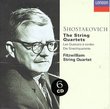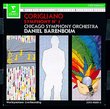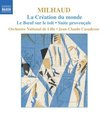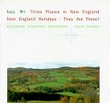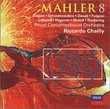| All Artists: Thomas Ades, Markus Stenz, Andrew Clark, Michael Niesemann, Richard Benjafield, James Boyd, Judith Busbridge, Louise Hopkins, Susan Knight, Lynsey Marsh, Paul Richards, Jonathan Tunnell, Paul Watkins, Robert Quinney Title: Thomas Ad�s: Living Toys Members Wishing: 2 Total Copies: 0 Label: Angel Records Release Date: 11/5/2002 Album Type: Import Genre: Classical Styles: Opera & Classical Vocal, Chamber Music, Symphonies Number of Discs: 1 SwapaCD Credits: 1 UPC: 724357227124 |
Search - Thomas Ades, Markus Stenz, Andrew Clark :: Thomas Ad�s: Living Toys
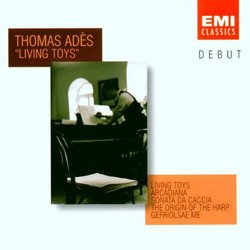 | Thomas Ades, Markus Stenz, Andrew Clark Thomas Ad�s: Living Toys Genre: Classical
This is the second recording of music by young British composer Thomas Adès, and it contains several quite impressive works, mostly written between 1993 and 1994. His seven-movement, 20-minute string quartet Arcadiana... more » |
Larger Image |
CD DetailsSynopsis
Amazon.com This is the second recording of music by young British composer Thomas Adès, and it contains several quite impressive works, mostly written between 1993 and 1994. His seven-movement, 20-minute string quartet Arcadiana (Op. 12) stands as the most complete achievement on this disk, and it's a work of striking ingenuity and confidence. Adès was 27 when this recording was released, and more than anything it's a document of an imaginative artist finding his own voice. "The Origins of the Harp" is moving for its dramatic turns and a poignant sense of closure. "Gefriolsae Me," sung by men from the Choir of King's College, Cambridge, springs upward from a medieval motet. The title work is the most harmonically jagged and rhythmically free of these works and points to an ever-searching spirit. Among the musicians, the London Sinfonietta, the Endellion Quartet, and Adès himself perform with great precision and care, and the engineering is superb. --Pierre Ruhe Similarly Requested CDs
|
CD ReviewsCraft alone isn't enough K. Doles | 07/30/2001 (2 out of 5 stars) "I truly feel strange writing this review, as it is the most negative one I have yet contributed for any composer. I first heard the name of Thomas Ades about four years ago, when a fellow composer told me that he was, and I quote, "the greatest British composer since Britten." Needless to say, my expectations were rather high when I first purchased this recording to try and acquaint myself with his music. I must say that his grasp of the CRAFT of musical composition is astounding for his age (which isn't too far from my own, to give us some perspective). Craft without original ideas, however, is useless. To me, Ades sounds like any number of a long line of British composers living in the long shadow of Harrison Birtwistle. What we get here is the standard line...complex and obtuse, without any real direction. "The Origin of the Harp" is the only work that prevents me from rating this disc even lower, as it has several enchanting moments , but not enough to save this album. His operatic works ARE better than the music presented here, without a doubt, but I am afraid that the hype surrounding Ades's work this early in his career could invariably stunt his compositional growth later in life. Though what I have heard to this point has been disappointing, I still expect great things from Thomas Ades in the future." Adventurous, appealing music Peter Shultz | Chicago, IL USA | 12/08/1999 (4 out of 5 stars) "Adès has been hailed as everything from "the new Mozart" to "the next Britten", and criticised just as enthusiastically for his perceived arrogance (the New York Times referred to his "spoiled-brat behavior"), but his music speaks for itself. In the chamber pieces featured here, he experiments further with his trademark sonorites, as established in his earlier pieces: shining harmonics on string instruments, pattering rhythmic counterpoint in the percussion, mercurial flourishes in the high-register woodwinds, and irritable growls in the low voices. His experiments with form are just as remarkable -- even as he constantly refers to well-known musical tropes of this century and others, he is constantly analysing and reinterpreting what has come before him. This is mature, self-aware music, from a young master. Beyond the orchestrational and formal aspects, though, is the profound emotionality of Adès' music. If this is your first experience with Adès, be warned: his music is not for everybody, and some of the dissonances can be quite appalling to the unprepared listener, as was suggested by earlier reviewers. That said, it's actually pretty accessible and can be appreciated by people with different levels of musical training. All that is needed is curiosity and an open mind. Wholeheartedly recommended." This is the greatest music I have heard in decades. Peter Shultz | 09/15/1999 (5 out of 5 stars) "Ades music is unique, original and should be totally refreshing to the ears of seasoned classical music listeners. The beauty is so subtle by the nature of its complexity (at the first listening) that one ought to listen to it for a few times before making judgements. As a professional musician for over 40 years and presently a college music instructor, I predict that Thomas Ades will eventually be regarded as a pivotal composer comparable to Josquin, Monteverdi and Beethoven - leading us to a new Era of serious music."
|

 Track Listings (24) - Disc #1
Track Listings (24) - Disc #1

